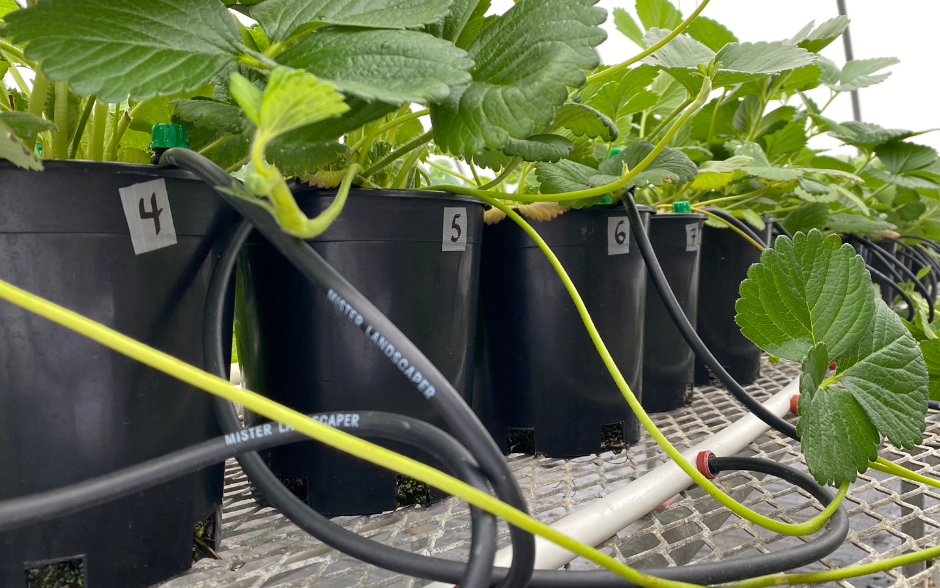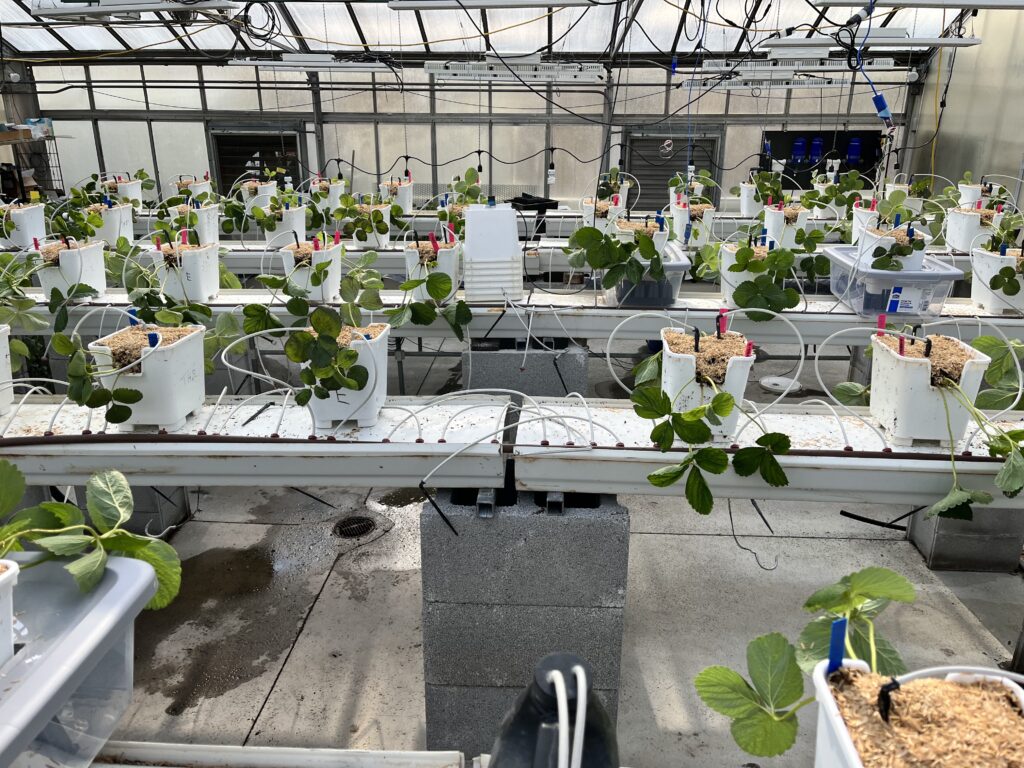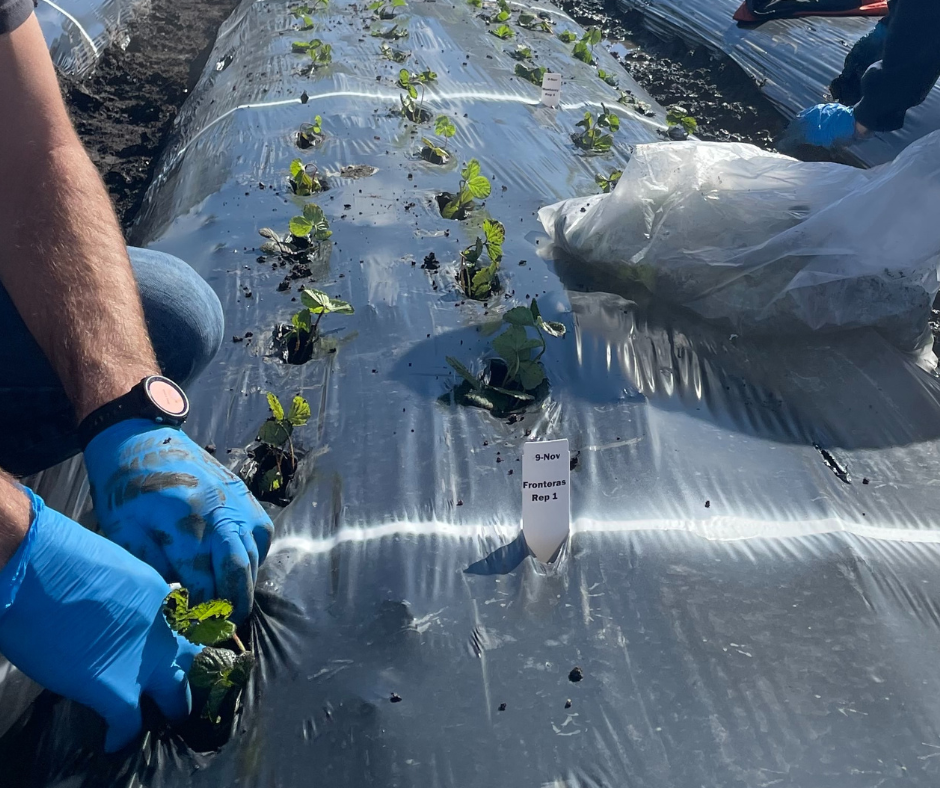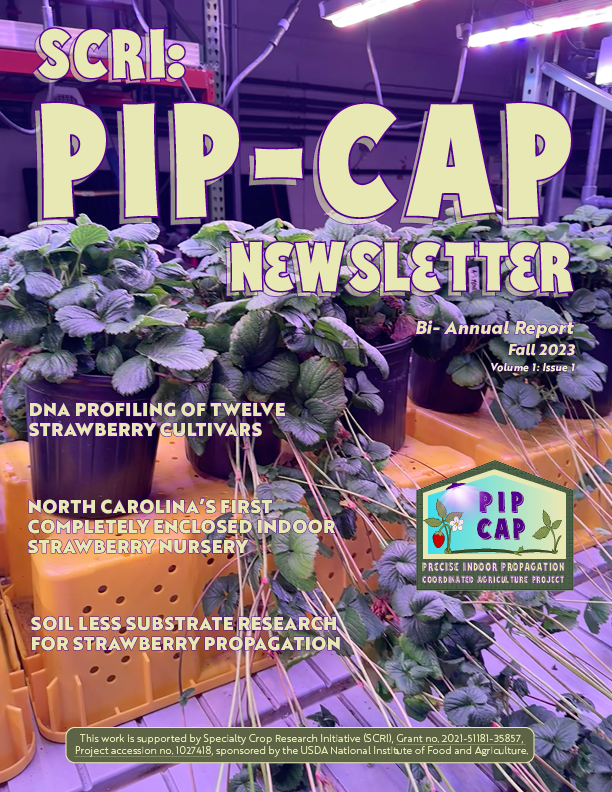Project Objectives
Our main aim is to develop cost-effective indoor strawberry propagation and conditioning protocols and transition them to industry. We hope to provide new tools to the strawberry industry, helping to diversify and hence increase the resilience of the American strawberry supply chain.
PLANT PHYSIOLOGY TEAM
Objective 1: Characterization of mother plant physiological responses to the environment.
Team Lead: Ricardo Hernandez
Co-PIs: Chieri Kubota, Jennifer Boldt, Brian Jackson
Students working in Dr. Hernandez lab: Moein Moosavi-Nezhad, Ph.D. student; Samson Humphrey, Master Student
Students working in Jennifer Boldt’s Lab: Dr. Erin Yufuso, Postdoctoral Researcher
Students working in Brian Jackson’s Lab: Brandan Shur, Master Student
We investigate optimized environmental conditions for above and below-ground strawberry mother plant propagation in 13 different strawberry cultivars. This will be done in fully controlled environment systems as well as in traditional greenhouse setups. We want to develop a set of protocols to achieve the most cost-effective propagation of strawberry plants for a range of cultivars in both systems.

Objective 2: Development of environmental protocols for transplant establishment, conditioning and long-term storage.
Team Lead: Chieri Kubota
Co-PIs: Edward Durner, Celina Gomez and Mark Hoffmann
Student working in Kubota’s lab: Pooja Tripathi, Ph.D. Student; Lian Duron, Master Student
Student working in Hoffmann lab: Michael Palmer, Ph.D. Student
We want to know how we can get the best fruit yield from strawberry plants and how can we store the plants most effectively. Therefore we are seeking to improve conditioning protocols for tray and plug plants, as well as storage protocols for transplants.

GENETICS TEAM
Objective 3: Development of a genetic tool to elucidate the runnering and flowering potential of genotypes, based on phenotypic responses to environmental treatments.
Team Lead: Caren Chang
Advisor: Zhongchi Liu
Student working in this lab: Dr. Xi Lou, Postdoctoral Researcher; Christina Ippoloti, Ph.D. Student.
We aim to develop a genome high quality database of 12 commercial US strawberry cultivars, and develop genetic examination protocols that can be used to specify ANY commercial strawberry plant into a specific propagation and conditioning protocol.
Strawberries are octoploids, which means they have eight copies of each gene. The team is examining each single variant of those genes known to affect runnering or flowering. These genes are: TFL1, FT1, 2, 3, RGA1, SOC1, GA20ox4, CO, LOS, and others. At the same time, we collect phenotypic response data of the genotypes that we use in our mother and daughter plant experiments. We the correlate phenotypic response data with the genotypic data that we collected.

ECONOMICS TEAM
Objective 4: Determine expected economic costs/returns to industry of adopting developed techniques, and estimate the economic impact of adoption on the US strawberry supply chain.
Team Lead: Daniel Tregeagle
Student working in Schweizer group: Yue Shan, Ph.D. student;
Student working in Tregeagle group: Jung Hoon Han, Ph.D student
We will assess the costs associated with producing strawberry plants under CE technology. Currently there is little documentation, and preliminary industry interviews revealed a wide variety of propagation methods, firm structure, and marketing models. Working with industry partners to document current practices will be useful to identify where these CE technologies fit in, as well as in evaluating future propagation innovations.
FIELD EVALUATION TEAM
Objective 5: Translation and integration of new propagation systems with industry partners.
Team Lead: Mark Hoffmann
Co-PIs: Gina Fernandez, Courtney Weber, Shinsuke Agehara, Oleg Daugovich, Jayesh Samtani
Students working in Hoffmann’s Lab: Dr. Ibraheem Olasupo, Postdoctoral Researcher
Students working in Holmes lab: Samantha Simard, Master Student
Students working in Weber lab: Ava Forystek, Master Student
Students working in Fernandez lab: Calyssa Stevenson, Master Student
Students working in Samtani lab: Baker Aljawasim, Ph.D. Student
Supporting Staff at NCSU: Kimberly Heagy, Research Assistant; Ian Mellon, Research Technician;
Once we have a range of protocols established (Obj. 1 and 2), industry collaborators agreed to adopt protocols to produce plants for field trials. We will investigate the performance of those transplants in field trials across the US eastern and western coasts. At the same time we will validate propagation and conditioning protocols with a variety of industry partners, from field-based nurseries to start-up companies.

EXTENSION AND COMMUNICATION TEAM
Objective 6: Development of services and products, extension and outreach activities to industry and public stakeholders.
Team Lead: Peter Nitzsche
Co-PIs: Jayesh Samtani, Oleg Daugovich, Mark Hoffmann, Shinsuke Agehara.
Supportive Staff: Lizeth Vigil, Kaitlyn Aguiles, Alexa Artis
Throughout the project we communicate the progress of the work to the researchers, industry and the general public. This website, field days, a news blog, webinars, etc. will be used to educate everyone involved in the strawberry supply chain to ensure adoption of the knowledge and technology developed.
This work is supported by Specialty Crop Research Initiative (SCRI), Grant no. 2021-51181-35857, Project accession no. 1027418, sponsored by the USDA National Institute of Food and Agriculture. Please use this link for more information.
